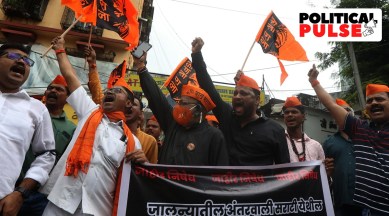Maratha quota agitation’s vanguard, Kranti Morcha also led 2016-’18 stir
The Maratha Kranti Morcha has a decentralised structure and emphasises collective leadership. Its district units have a committee and a team of coordinators who keep it ticking.

The Maratha quota agitation is back to the front and centre of Maharashtra politics and the organisation leading the charge, like in the past, is the Maratha Kranti Morcha (MKM).
A social front backed by established political players, the MKM’s support cuts across the political divide. The organisation came into prominence in August 2016 following the rape and murder of a teenager in Ahmednagar district. The Morcha hit the streets demanding that the case be fast-tracked and the accused be awarded capital punishment. Once the case faded from collective memory, the MKM’s main agenda came to the fore: Maratha reservation.
monthly limit of free stories.
with an Express account.
The MKM has a decentralised structure in that it does not have a central leadership body. The outfit emphasises collective leadership and its district units have a committee and a team of coordinators who keep it ticking. “The MKM is not a political outfit,” explained Rajendra Kondane, the coordinator. “It is not led by any politician or leader. It is a collective responsibility and effort of Marathas working for the welfare of the community.”
From 2016 to 2017, the Sakal Maratha Samaj under the MKM organised 58 silent rallies to push the reservation demand. At the end of every rally, a 10-point charter of demands was presented to the district collector, with the quota demand high on the agenda. The nature of the protests changed subsequently as the Marathas’ street protests in 2017-’18 took a violent turn and there were even some suicides. The first suicide case over the demand for Maratha reservation occurred in the Kannad taluka of Aurangabad district. Marathas said they would not settle for anything less than reservation and the “Ek Maratha, Lakh Maratha (One Maratha, a Lakh Marathas)” slogan was coined.
Sensing the growing discontent, in June 2017 the BJP government set up the Gaikwad Commission to look into the Marathas’ reservation demand. The commission in its report recommended that Marathas be given reservation under Socially and Educationally Backward Class (SEBC) but did not specify the quota percentage and left it to the state government. The government in November 2018 gave the Marathas reservation under the Maharashtra State Socially and Educational Backward Act. This faced legal challenges and in September 2020 the Supreme Court stayed its implementation and referred the case to a larger Bench. In 2021, the Supreme Court struck down the Maratha quota law.
The Uddhav Thackeray-led government that was in power at the time decided to accommodate those eligible among Marathas to access benefits under the Economic Weaker Section (EWS) quota. But the MKM labelled it “unacceptable”, keeping the issue simmering.
Who is Manoj Jarange Patil?
An advocate of the Maratha quota cause, Jalna resident Manoj Jarange Patil has undertaken various hunger strikes and marches since 2014 to push the demand. Most of his protests, however, did not find resonance beyond Jalna district. Patil has often been part of delegations to various state politicians seeking reservation for the community. Last August, he was among Maratha activists who went to Maharashtra Chief Minister Eknath Shinde to press their demand.
This time, however, the lanky, mullet-sporting Patil managed to make himself heard as he began a hunger strike along with seven others on August 29. Though Shinde called the activist and urged him to call off the protest, Patil is said to have turned down the CM. The protests started after a large police contingent went to the protest site last Friday and said Patil should be hospitalised because of his deteriorating condition. The protesters alleged that the police beat up several of them and tried to forcefully move out Patil.
From planning to execution, MKM rallies require a lot of funding and a Maratha leader in the Congress said, “All Maratha leaders, both ruling and Opposition MLAs, professionals, and farmers support the Morcha through funds and logistics.” An MKM leader said, “We have a strong and robust network in place and WhatsApp is the chosen medium of communication. Once a committee decides the protest road map, it is circulated on WhatsApp. In each of the 40,000 villages and 355 talukas there are a handful of Maratha members who actively lead the organisation. There are no appointments or remuneration as it is all voluntary service.”
When its activists face legal trouble in connection with demonstrations, the Morcha provides them with free legal aid, according to an MKM leader. “The emphasis on collective decision-making is to avoid internal conflicts. The main agenda is the restoration of Maratha reservation.”
An MKM coordinator in the state’s Marathwada region said, “Manoj Jarange Patil’s decision to go on indefinite fast has elicited massive support because of support from people and not politicians or political parties. Unfortunately, every politician is trying to use the agitation to their advantage.”
According to sources, the MKM is likely to convene a meeting next week. A Morcha leader said, “The 2016-’18 agitation required big plans and a follow-up. This protest may not be on that scale but we will have to strike a balance to give the state government time to find a lasting solution.”
— With inputs from Zeeshan Shaikh